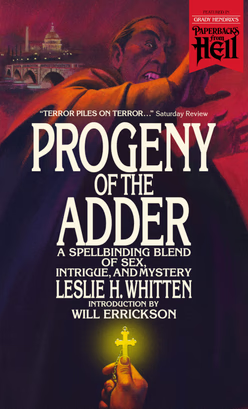Progeny of the Adder

Leslie H. Whitten’s Progeny of the Adder arrived in 1965 with little fanfare and even less commercial success. What a shame. This forgotten gem deserves recognition as the first modern vampire novel—a gritty police procedural that trades Gothic castles for the muddy banks of the Potomac.
Detective Harry Picard isn’t your typical literary hero. He’s unremarkable, competent, methodical. “He was not the Sherlock Holmes type,” Whitten tells us with refreshing honesty. This ordinariness becomes the book’s secret weapon. When blonde women start turning up in the river with their throats cut, Picard approaches the case like any good cop would—even when the evidence points toward something supernatural.
Whitten, a Watergate-era investigative reporter, knows police work from the inside. The procedural elements feel authentic, frustrating, real. No brilliant deductions here. Just shoe leather and persistence.
The vampire angle works because Whitten plays it smart. His cops don’t scoff at the supernatural; they reason that if the killer believes he’s a vampire, then crosses might work through psychological manipulation. It’s logical. It’s brilliant. And it lets Whitten have his cake and eat it too, building genuine suspense while maintaining credibility.
While not a Chandler-level wit, Whitten’s prose occasionally sparkles. An alcoholic woman “already breathed her bane.” Noting the all-white makeup of the gawkers at a funeral, Picard doesn’t ponder why because, “He was a detective, not a sociologist.” When a Jewish cop receives a cross for protection, he quips, “I’m the only Rosenbaum in a couple hundred generations to ever carry one of these things.”
But 1965 was 1965. The casual racism, homophobia, and sexism feel jarring today. Whitten captures his era’s prejudices with documentary precision, critiquing some of them through Picard’s perspective. The lone female character of note, a police officer named Suzy, gets relegated to analyzing clothes and playing decoy, but Whitten grants her what agency the times allowed.
Whitten occasionally stumbles. During a car chase, characters are “shattered” by tragedy then “have no time for such thoughts.” Throughout, Whitten’s obsession with ‘P’ names borders on the ridiculous—Picard, Pulanske, Pantelein, Paulier. Did he lose a bet?
None of this matters when the story grips you. The climax unfolds with cinematic intensity. Whitten doesn’t overstay his welcome with endless epilogues or sequel setup. When it’s over, it’s over. Abrupt but satisfying.
Progeny of the Adder got lost in literary history, overshadowed by Jeff Rice’s The Kolchak Papers and its TV movie success. I suspect the blame lies partly with Whitten’s academic title, borrowed from Baudelaire. Call this The Night Stalker and it might have flown off shelves.
Reading History
- 2025Jul11FriEbook (Valancourt Books, 2022)
Read over 8 Days
- 4 Jul 20255%
- 5 Jul 202526%
- 6 Jul 202540%
- 7 Jul 202558%
- 8 Jul 202586%
- 11 Jul 2025Finished